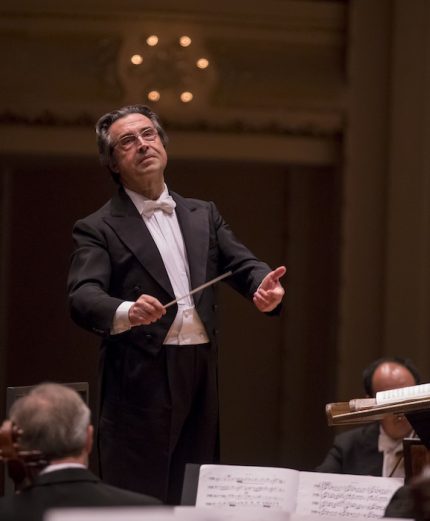Muti, Chicago Symphony open season with rich and eloquent Bruckner

Riccardo Muti conducted the Chicago Symphony Orchestra in Bruckner’s Symphony No. 7 Thursday night. Photo: Todd Rosenberg
Opening night of the Chicago Symphony Orchestra’s 126th season was pretty much a no-frills, straightforward affair Thursday at Symphony Center. Riccardo Muti strode out to vociferous cheers and applause, gave the downbeat to the National Anthem and launched his seventh season as music director.
If the surface elements seemed all business, the music-making was anything but, particularly in the evening’s main work, Anton Bruckner’s Symphony No. 7.
Bruckner’s music has, of course, enjoyed a long and storied association with the CSO. Founder Theodore Thomas presented the U.S. premieres of Bruckner’s Symphony No. 9 and his Te Deum, both performed under Muti three months ago to close last season. Thomas presented four Bruckner symphonies in the orchestra’s earliest years, a tradition continued by Frederick Stock and on through Sir Georg Solti, Carlo Maria Giulini and Daniel Barenboim to Bernard Haitink and Riccardo Muti today. (Solti and Barenboim each recorded complete Bruckner cycles with the CSO, on Decca and DG, respectively).
If Muti’s clarity and bold projection shorted an essential spiritual element in the Ninth last June, he appeared fully in synch with the epic Seventh.
One brief horn blip apart, the mysterious opening bars unfolded with a breadth and concentration that set the stage for the hour-long journey to follow. The ebb and flow was surely handled with the stop-start alternation between dramatic brass outbursts and Bruckner’s endearingly naive pastoralism flowing in a natural, wholly organic manner.
After much recent upheaval, the CSO woodwinds appear to be coming together, individually and as a cohesive unit. Stefán Ragnar Höskuldsson seems more comfortable than in his first season as principal flute—playing with fuller tone and greater projection, conveying the bucolic charm of Bruckner’s gracious al fresco writing.
The Adagio–a solemn tribute to the composer’s recently passed idol, Wagner–is the heart of the symphony. Led by Daniel Gingrich, the four Wagner tubas brought a sepulchral eloquence to this elegiac music that was deeply moving. Muti deftly guided the searching narrative through the prevailing subdued tragedy and, ultimately, its luminous climax. (Surprisingly for such an Urtext musician, Muti maintained the spurious if effective added cymbal and triangle.)
The cockerel theme of the ensuing Scherzo went with admirable swagger. In the optimistic finale, Muti drew together the disparate themes skillfully, underlining a Haydnesque lightness in the perky main theme. The musical argument built inexorably to the final section, with a decisive hard-won triumph in the resplendent coda, the nine horns lending weighty gravitas to the final peroration.
Even by local standards, the playing of the orchestra was extraordinary, impressive as much for the many characterful solo contributions as much as the high-sheen ensemble cohesion.
It was a pleasant surprise to see Christopher Martin in his regular principal trumpet chair and performing with his usual distinction, when one expected him to have alighted to the New York Philharmonic. A CSO spokeswoman said that despite the announcement that he will become principal trumpet in New York, he “remains a CSO member” and will perform “select weeks” in Chicago this season.
The evening’s first half consisted of a pair of populist showpieces, both making up in polish and virtuosic execution what they lacked in programmatic contrast. As is often the case with Muti’s fall programs, they also amounted to tour prep with both works scheduled for the CSO’s European concerts in January.
Mussorgsky’s Night on Bald Mountain offered a pendant of sorts to last season’s 125th anniversary series spotlighting premieres by the orchestra. CSO archivist Frank Villella has recently confirmed that the CSO appears to have given the first U.S. performance of Mussorgsky’s tone poem as the core ensemble of the “Exposition Orchestra” at the 1893 Columbian Exposition.
Muti led a characteristic performance of the witchy Mussorgsky-Rimsky-Korsakov confection, bold and thrusting, perhaps stronger on dramatic cut than atmosphere. The final section was most striking, the first rays of daylight conveyed by gently yielding violins and slender, silvery contributions by clarinetist Stephen Williamson and flutist Höskuldsson.
Muti’s forays into Richard Strauss in Chicago have been markedly few to date: just Aus Italien (of course) and Death and Transfiguration in his inaugural season.
Thursday’s fizzing performance of Don Juan made it clear that he should do more: fast, dashing, and knife-edged, Muti led a bravura reading with the blazing virtuosity of the orchestra in this challenging music impressive even to regulars.
Back in his former chair the CSO’s old-new principal oboe Alex Klein lifted a poised and expressive solo in the central “love” theme and the horns soared thrillingly over the ensemble at the work’s climax. Here too, Muti found an extra degree of expressive concentration in the quiet coda, which felt less anticlimactic than usual.
The program will be repeated 7:30 p.m. Tuesday. cso.org; 312-294-3000.